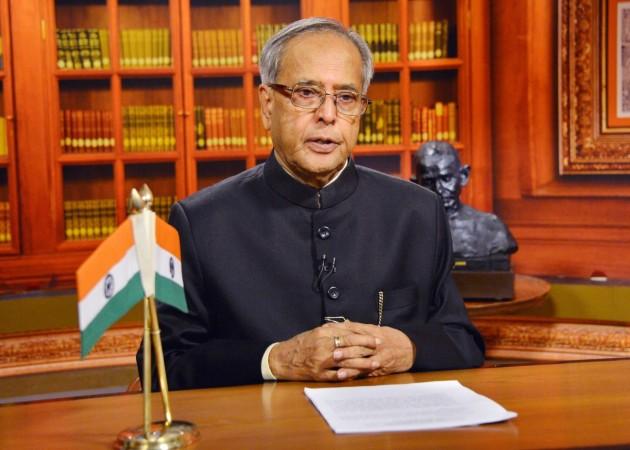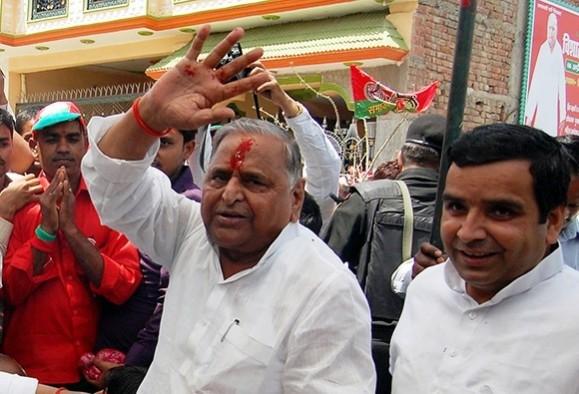
In India, presidential elections were turned into a stage of political muscle-flexing in the Indira Gandhi days. Since VV Giri had reduced himself into the prime minister's president, the apolitical post has slowly been engulfed by the forces of politics and today, elections to choose the president have become a parallel exercise by the political parties to broaden their own spheres of influence.
In 2017, the picture is no different. However, compared to the eventful presidential election of 2012, the script for the upcoming one has unfolded a bit differently.
In the past presidential elections, the rulers have shown more intent in choosing and backing consensus candidates but the BJP, which is the ruling party of the day, hasn't shown much hurry. Rather, it is the Opposition parties that are busier to put together the pieces.
The reason is not difficult to understand: earlier, the ruling parties used to treat the presidential election as an opportunity to test their allies' intention. Simply, it was an interim testing of one's own strength in the era of coalition politics.
The Lok Sabha election of 2014 had transformed India's electoral character, bringing back the days of single-party majority. And with the BJP winning one state after another since that sweeping victory, Prime Minister Narendra Modi doesn't really have to fathom the waters even if the next general elections are just two years away.
How Mamata Banerjee and Nitish Kumar are playing their games
The Opposition, on the other hand, are busy because this presidential election has given them a chance to see where they stand amid the Modi tsunami. The chief ministers of West Bengal and Bihar – Mamata Banerjee and Nitish Kumar – are prime examples.

Speaking about the former first, things have not turned out the way Mamata would have liked in the post-demonetisation days as the BJP gave a big blow to her plans for a grand alliance by decimating the Samajwadi Party-Congress alliance in UP earlier this year.
The saffron brigade is also on the rise in Bengal's politics and with the ruling Trinamool Congress (TMC) facing some serious corruption charges, Mamata is certainly not the most relaxed soul around. She is thus seen playing a proactive role ahead of the presidential elections and has even thought of backing the incumbent – Pranab Mukherjee – for a second term.
It is not that the TMC supremo hasn't made things complicated by saying she is also game to back the likes of LK Advani or Sushma Swaraj or even Lok Sabha Speaker Sumitra Mahajan but one thinks these talks are aimed either at widening the divide between the old and new BJP or to divert public attention from what she actually wants.
Mamata had a great disliking for Pranab Mukherjee in 2012; this time, she is game
Though it is an exact opposite to what Mamata had done ahead of the 2012 presidential elections till SP patriarch Mulayam Singh Yadav left her embarrassed publicly, one sees the TMC has a big interest to serve by backing Mukherjee. In 2012, because of her frustration with Mukherjee for not granting her debt-trapped state any relief as the UPA's finance minister and a personality clash, Mamata had initially refused to back Mukherjee, who was the candidate of the ruling Congress then.

But her plan to float an alternative candidate (she had even backed the then prime minister Manmohan Singh as her preferred presidential candidate) was ruined by the wily Mulayam and she eventually had to bite the dust for as the chief minister of a state with high Muslim population, it was not politically feasible for her to go for the BJP's candidate even as the saffron party was wishing so to get her into the NDA's fold. The arrival of Modi, nevertheless, changed everything.
For Mamata, the stake is much bigger in 2017
This time, Mamata is not worried about her personal terms with Mukherjee and is eyeing to get closer to the Congress to get her plan for a mega anti-Modi alliance going and also disrupt the bonhomie between the Congress and Left. Though a certain quarters are saying that Mamata is playing it with maturity and caution this time, but even her most loyal supporter will not deny that she has a huge stake this time, compared to 2012.
Then, being the second-largest ally in the central government and with the bombs of corruption still some years away from blasting, Mamata had a much stronger position to toy with the Centre. This time, it is a battle for survival for her on national politics. If the candidate backed by her loses the presidential elections, she will lose yet another battle against Modi.
Nitish Kumar is swimming with the tide and waiting for the right opportunity
Nitish Kumar, on the other hand, is also playing it cautiously though he hasn't thrown tantrums around like Mamata against Modi. Kumar has also backed Mukherjee, perhaps with the idea that the incumbent is already a tested candidate and could see more parties rallying behind him, giving Kumar an opportunity to play a bigger role in the federal front. Though on the face, Kumar has said that he is not in the race to become the PM in 2019, the seasoned politician knows that saying he is in the race now will only make him look a fool.

In 2012, Nitish Kumar backed a Muslim face; no more this time
The JD(U) chief is shrewd enough to wait for the right time to strike. What is significant is that Kumar, who was part of the NDA in 2012, had disliked ally BJP's not preferring Hamid Ansari as the presidential candidate.
Kumar, who has a secular image, wanted to strengthen his party's minority vote-bank by backing Ansari, who eventually became the vice president. This time, having read the pitch perfectly, Kumar has discarded communal calculations and is trying to adjust to personality-centric politics. This is a new reality in Modi-fied India.
With the Congress getting weakened day by day, Mulayam Singh's party and himself in disarray and Jayalalithaa no more alive (she was active in the last election by backing the late PA Sangma), Mamata and Nitish have emerged as the top game-makers in this presidential election. Political observers will be keen to see how these two leaders go about from here to make it competitive against Modi, albeit in different ways.





!['Lip lock, pressure, pyaar': Vidya Balan- Pratik Gandhi shine in non-judgmental infidelity romcom Do Aur Do Pyaar [ Review]](https://data1.ibtimes.co.in/en/full/797104/lip-lock-pressure-pyaar-vidya-balan-pratik-gandhi-shine-non-judgmental-infidelity-romcom.jpg?w=220&h=138)







